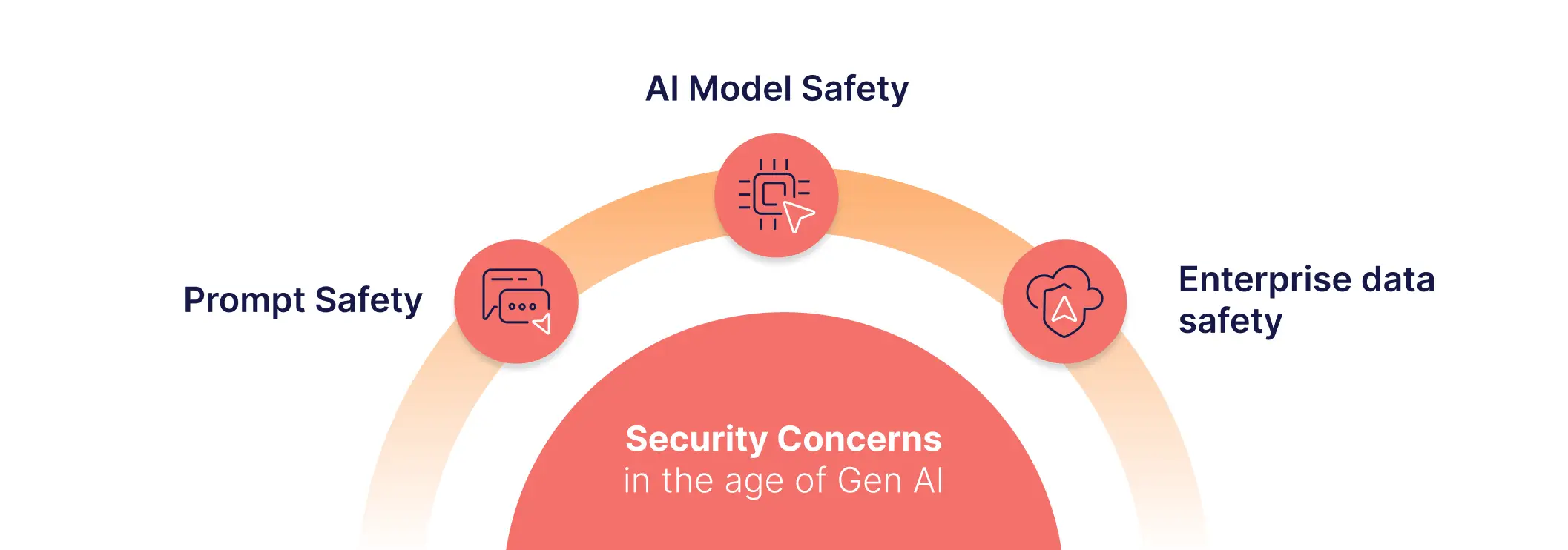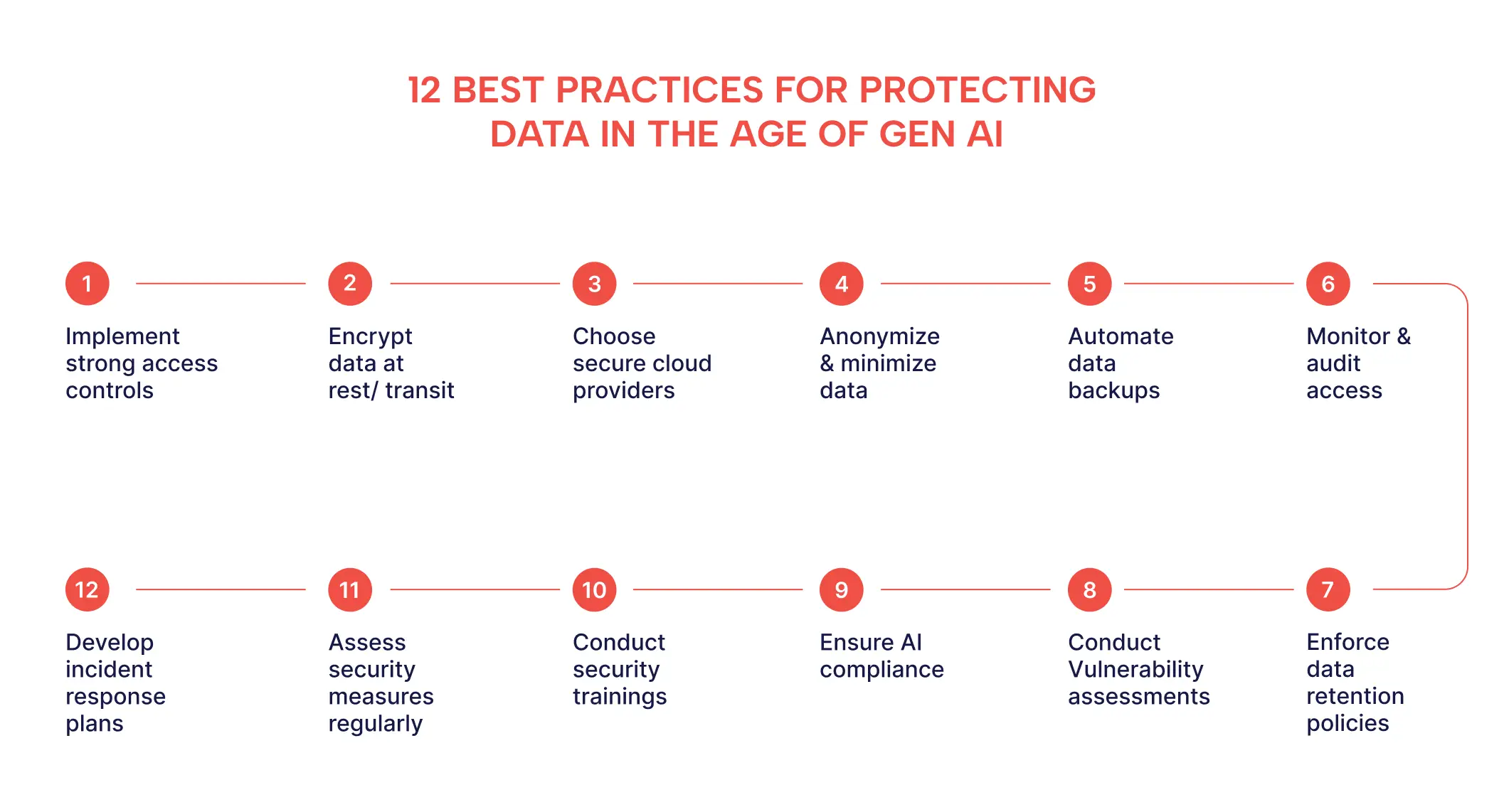12 Best Practices for Safeguarding Data in the Age of Generative AI
Nov 29, 2024
Generative AI is transforming a vast array of industries, offering unprecedented economic potential and enhancing operational efficiencies across global businesses. Despite its transformative potential, it also introduces significant challenges, particularly in the realms of data privacy and security.
Many companies are not yet fully equipped to handle the widespread adoption of general AI, nor the potential business risks associated with these tools. According to McKinsey, while 53 percent of organizations recognize cybersecurity as a risk related to general AI, only 38 percent are actively taking steps to mitigate this risk.
As we march deeper into the age of Generative AI, understanding its security risks becomes increasingly crucial. To harness the power of generative AI effectively and ethically, businesses must implement comprehensive governance frameworks, establish guidelines for ethical AI usage, and enforce stringent data protection measures.
This article will discuss best practices to help you navigate the complexities of generative AI, ensuring responsible utilization and safeguarding sensitive information in this dynamic technological landscape.
Data Privacy: A Cornerstone in the Generative AI Revolution
Safeguarding sensitive information isn’t just about avoiding breaches—it's about building trust, exercising control, and managing risks effectively. A striking example of these challenges surfaced recently with Microsoft's Copilot, wherein employees inadvertently gained access to highly sensitive information, such as CEO's emails, due to initially lax permission settings. This situation emphasizes the need for organizations to not only protect sensitive information but also to manage how it's accessed and used, transforming data privacy from a compliance obligation to a cornerstone of technological innovation and trust.
Trust and Reputation Enhancement: Organizations that prioritize data privacy demonstrate their commitment to protecting sensitive information, thus enhancing their credibility. Consumers and partners are more likely to engage with businesses they trust to handle their data responsibly.
Control Over Information: One of the fundamental aspects of data privacy is gaining control over information. Data privacy laws and regulations empower organizations to dictate how their data is used and who has access to it. Compliance with these laws ensures that sensitive proprietary information remains confidential. Without this level of control, organizations risk exposing themselves to unwanted scrutiny and potential loss of confidential data.
Risk Management: Managing risk is an ongoing challenge in any organization, especially with the advent of Gen AI. By putting robust data privacy measures in place, organizations can mitigate the odds of experiencing data breaches and cyber-attacks. This proactive approach is crucial in preventing incidents that could lead to financial losses, hefty fines, and damage to operational capabilities.
Major Data Privacy Challenges in Generative AI
While Gen AI offers incredible innovations, it also presents significant challenges to data privacy. Understanding these threats is vital to safeguarding sensitive information.
AI Model Safety Issues: The core concern with Generative AI revolves around the safety and ethical integrity of AI models. These sophisticated models operate with billions of parameters, creating a fertile ground for potential misuse, biases, and unethical manipulation. Without stringent oversight, these models are at risk of becoming tools for unethical outcomes or legal transgressions.
Enterprise Data Risks: The capability of Generative AI to process vast amounts of enterprise data is a double-edged sword. On one hand, it drives efficiency and innovation; on the other, it poses a significant risk of exposing sensitive data. The technology's adeptness at mimicking and automating can inadvertently lead to breaches of confidentiality and increases the susceptibility to social engineering attacks.
Prompt Security Concerns: The interaction with Generative AI through prompts—both from systems and users—introduces another layer of risk. These prompts, essential for directing AI behavior, can become gateways for security breaches. Vulnerabilities here can lead to situations where prompts are manipulated to extract confidential information or alter AI behavior, potentially leading to severe security breaches.

12 Best Practices for Protecting Data in the Age of Generative AI
As organizations increasingly integrate Gen AI into their operations, the importance of ensuring the privacy and security of data cannot be overstated. Here are comprehensive strategies enterprise customers can adopt to safeguard data throughout the lifecycle of AI development:
Implement Strong Access Controls
Role-Based Access Control (RBAC): Limit access to sensitive app data by defining user roles within your organization. Ensure that only personnel whose job responsibilities require access to specific datasets can view or modify them. This minimizes potential exposure to unauthorized users.
Multi-Factor Authentication (MFA): Strengthen security protocols by implementing MFA. This method requires users to authenticate their identities using more than one verification method, significantly reducing the risk of unauthorized data access.
Data Encryption Practices
Encrypt all sensitive data at rest using robust encryption standards such as AES-256. This ensures that data remains protected even if unauthorized access occurs. Additionally, employ secure protocols like TLS and HTTPS to encrypt data in transit, safeguarding it from interception during transmission.
Secure Data Storage and Transmission
Select cloud storage providers like AWS S3 or Google Cloud Storage that offer encrypted storage solutions and frequent security updates. When transmitting data, whether internally or externally, always use encrypted communication channels to maintain data confidentiality and integrity.
Implement Data Anonymization, Minimization, and Masking
Anonymization Techniques: Apply techniques such as generalization and randomization to anonymize personal data. This helps maintain user privacy while still allowing for meaningful data analysis.
Data Masking: In non-production environments, use data masking to conceal sensitive information. This is crucial during the development and testing phases to prevent data leaks.
Data Minimization: Use the least amount of data necessary for training generative AI models. This approach not only enhances privacy but also reduces the impact of potential data breaches.
Regular Data Backup and Recovery
Establish automated backup processes to ensure that all important data is duplicated and stored in multiple secure locations. This redundancy helps mitigate the risk of data loss due to hardware failures, cyberattacks, or human errors, thereby ensuring business continuity.
Monitor and Audit Data Access
Implement comprehensive logging and real-time monitoring systems to track data access and activities. Regular audits should be conducted to assess security practices, identify vulnerabilities, and ensure compliance with data protection regulations.
Data Retention and Disposal Policies
Develop clear data retention policies that comply with legal and business requirements. When data is no longer needed, employ secure disposal methods like data wiping or physical destruction to prevent unauthorized recovery and access.
Vulnerability Assessment and Penetration Testing
Perform vulnerability assessments regularly to identify security weaknesses and conduct penetration tests (ethical hacking) to evaluate the robustness of your security measures. These practices help in the early detection of potential threats and fortify your cybersecurity defenses.
Promote Responsible AI Usage
Risk Management: Identify and mitigate risks related to AI, such as data privacy concerns, biases, and potential misuse. Implement controls to manage these risks effectively.
Compliance: Ensure all AI applications adhere to relevant data privacy laws and regulations, such as GDPR and CCPA. This not only protects consumer data but also builds trust and enhances the organization's reputation.
Comprehensive Training and Awareness Programs
Human error is a significant cybersecurity risk. Regular training sessions should be held to educate employees about the latest security threats, like phishing, and reinforce the importance of security best practices. A well-informed workforce is a critical defense against cyber threats.
Regular Security Assessments and Updates
Continuously assess and update your security measures in response to new threats and vulnerabilities. This proactive approach is essential to maintain a strong defense against evolving cyber threats.
Developing Incident Response Plans
Prepare and regularly update incident response plans to ensure quick and effective action in the event of a data breach. This preparation is crucial for minimizing damage and restoring operations swiftly.
By implementing these best practices, enterprises can significantly enhance the security and privacy of their data in the AI era, ensuring that their innovations in AI are safe, secure, and trusted by all stakeholders.

The Path Forward: Upholding Data Integrity in AI
The journey into the age of Generative AI holds great promise, but it demands vigilance and commitment to data privacy to ensure that this promising future is secure for everyone involved.
This means not only embracing the technology's potential to transform businesses but also rigorously defending the sanctity of data privacy. By integrating robust security measures and ethical guidelines, companies can safeguard sensitive information and maintain the trust of consumers and partners alike. Implementing practices such as strong access controls, data encryption, and regular security assessments will fortify defenses against potential breaches and misuse. Moreover, fostering a culture of security awareness and compliance will empower organizations to manage emerging risks proactively.
At Aviso, we embody this commitment by implementing cutting-edge security protocols and compliance measures, ensuring that our AI solutions uphold the highest standards of data integrity and privacy. Our advanced data management strategies and continuous monitoring systems are designed to protect against vulnerabilities, providing our clients with the assurance they need to trust in our technology.
Know More about Aviso’s approach to data security in the Gen AI Era.
Or book a demo with Aviso to discover how we can transform your business with secure and reliable Gen AI solutions.


